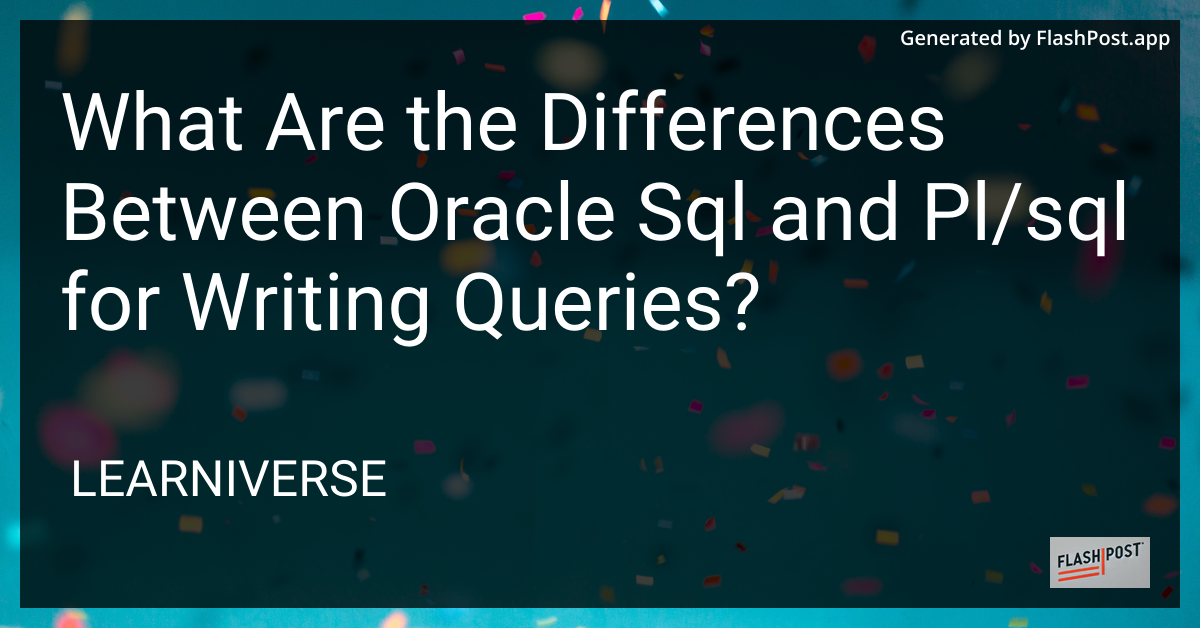What Are the Differences Between Oracle Sql and Pl/sql for Writing Queries?

When it comes to managing databases in Oracle, two essential tools stand out: Oracle SQL and PL/SQL. Each serves unique purposes and is tailored for specific tasks in database management and manipulation. Understanding their differences is vital for optimizing your database operations. This article explores the key distinctions between Oracle SQL and PL/SQL in writing queries and how they can be best utilized.
What is Oracle SQL?
Oracle SQL (Structured Query Language) is the standard language used to interact with relational databases. It is designed for querying, updating, and managing data stored in a database. SQL statements are typically used to perform tasks such as querying data (see how to get column names in an Oracle select), inserting new records, updating existing records, and deleting records from tables.
Key Features of Oracle SQL
- Declarative Language: SQL is inherently declarative, meaning users specify “what” they want, letting the database system figure out “how” to accomplish it.
- Data Manipulation: It provides operations for data retrieval, insertion, updates, and deletion.
- Data Definition: SQL allows you to define and manage database schema.
- Data Control: It includes commands for setting permissions and access controls.
What is PL/SQL?
PL/SQL (Procedural Language Structured Query Language) is Oracle Corporation's procedural extension for SQL. It combines the power of procedural programming and SQL for Oracle databases, offering greater flexibility and efficiency, especially for more complex programming and task automation needs.
Key Features of PL/SQL
- Procedural Capabilities: Unlike SQL, PL/SQL includes procedural language elements like conditions and loops, enhancing the control flow.
- Error Handling: PL/SQL allows you to trap runtime errors, which can be managed gracefully.
- Tight Integration with SQL: PL/SQL is tightly integrated with Oracle SQL, enabling seamless data manipulation.
- Support for Complex Operations: It supports more complex and reusable code with functions, procedures, and packages.
Key Differences Between Oracle SQL and PL/SQL
- Nature of Language: SQL is declarative; you specify the desired result, whereas PL/SQL is procedural, allowing complex decision-making and iterations.
- Purpose: SQL is used for single queries and simple operations on data, while PL/SQL is suited for writing full-fledged programs and handling complex transactions.
- Execution: SQL executes single queries while PL/SQL can run blocks of code that contain multiple SQL queries, control structures, and exception handling.
- Reusability: PL/SQL enables code reusability through the use of procedures and functions, making it ideal for complex operations and modular programming.
Each tool has its strengths, but when used together, they enable robust database management and optimization. For instance, to optimize Oracle queries, you can explore strategies here.
Expand Your Oracle Knowledge
- Learn how to query between hours and minutes in Oracle.
- Explore techniques for querying data when the result set includes null records.
- Find out how to multiply rows in Oracle query by count.
By understanding the distinct roles and capabilities of Oracle SQL and PL/SQL, you can optimize database operations, improve query performance, and enhance your overall database management strategy.